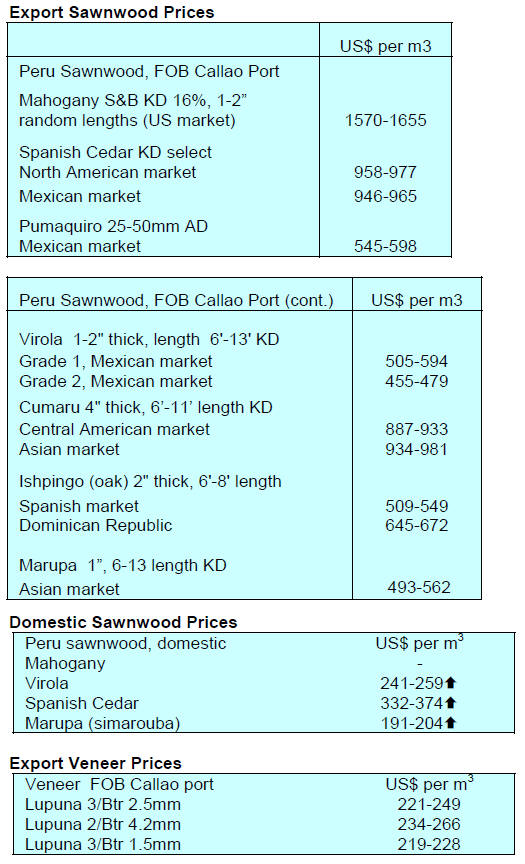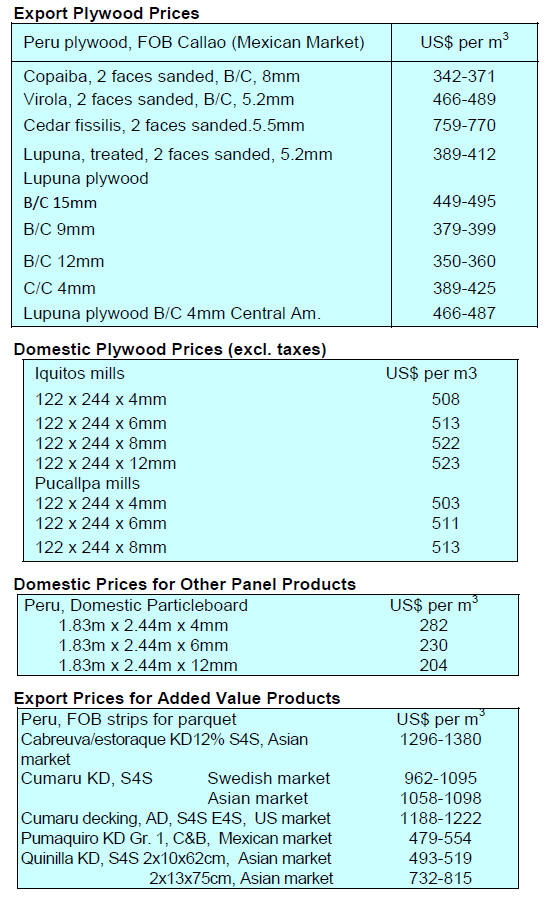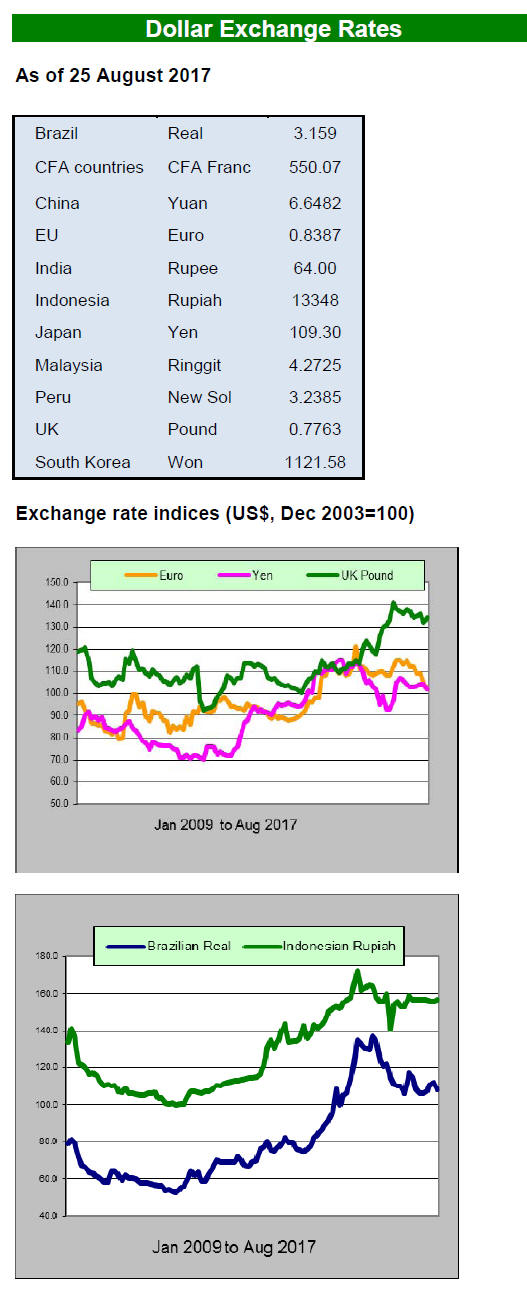2. GHANA
Ghana seeks to increase export volumes
The government is preparing a strategy to increase exports
from US$290 mil. to US$500 mil. by 2020 under the
Africa Growth and Opportunity Act, a United States
Trade Act enacted on 18 May 2000 which has since been
renewed to 2025. This legislation significantly enhances
market access to the US for qualifying Sub-
Saharan African countries.
Ship-based power unit arrives
With a recently concluded 10 year agreement between
Karlpower Ghana Ltd and the Electricity
Company of Ghana Limited (ECG), the government has
taken a decisive step to end the power supply problems in
the country.
In late August a large ship-based power plant known
as
Karadeniz Powership Osman Khan arrived in Ghana. The
‘power-ship’ will start delivering electric power to
Ghana’s grid in September.
The vessel is anchored in the Tema Fishing Harbour. It is
anticipated that the unit will provide around 450MW, a
significant contribution to the country’s electricity supply.
The Association of Ghana Industries (AGI) has lobbied for
years trying to get the government to address the power
shortage problem. A report from the Institute of Statistical,
Social and Economic Research (ISSER) of the University
of Ghana says SMEs in Ghana which include many timber
manufacturing companies suffered financial losses in
years of power outages.
ISSER estimates that these businesses lost about
US$56.24 mil. due to the energy crisis that began in 2011.
Ghana Ports go paperless
The government is promoting a paperless port system that
will significantly improve port operations. The paperless
port clearing process is expected to start from September
1, 2017.
Preparations for paperless port operations started in 2012
but were seriously delayed as neither the port authorities
nor customers were prepared.
In May-2017 the government outlined 3 measures for the
removal of customs barriers within the country, mandatory
Joint Inspections and paperless port operations. Port
operations have been identified by users as centres of
corruption and inefficiency.
According to the Ghana Ports and Harbours Authority
statistics, the country has been recording impressive cargo
traffic. Arrivals at Tema Port in 2016 rose by 1,269,288
tonnes or 10.5% year on year.
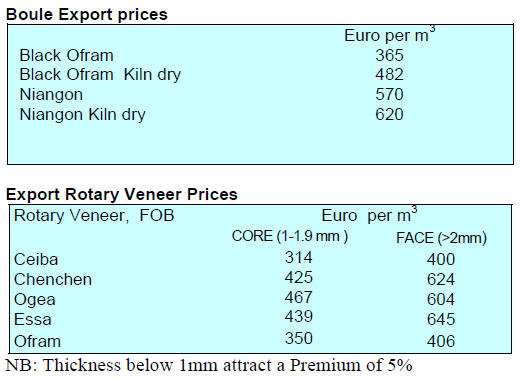
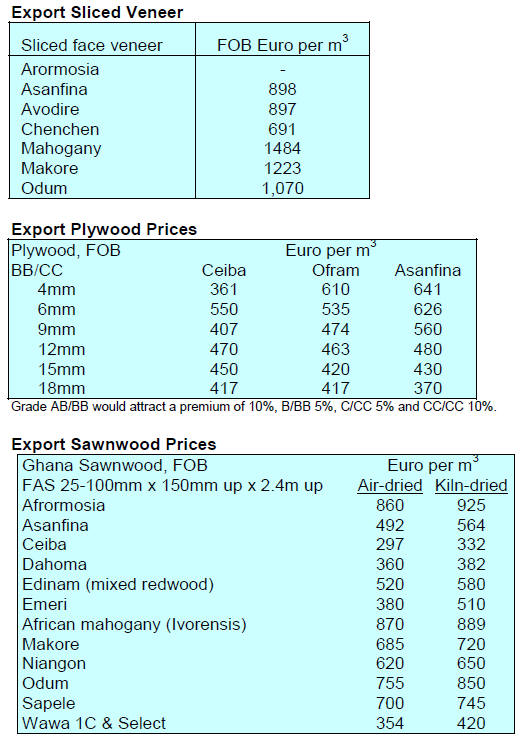
3.
SOUTH AFRICA
South African Forestry Assurance Scheme (SAFAS)
South Africa is developing a South African National
Forestry Certification Standard as part of the South
African Forestry Assurance Scheme (SAFAS) which will
seek endorsement by the Programme for Endorsement of
Forest Certification (PEFC). South Africa became the
fourth African national member of PEFC in June this year
alongside Cameroon, Gabon and Ghana.
The SAFAS website spells out the objective as to have a
National Certification Scheme that is based on the The
National forest Act No 84 of 1998 which defines
Principles, Criteria and Indicators for sustainable forest
management that is appropriate for all scales of forestry
operations.
SAFAS writes, “The goal is for forestry certification to be
a tool for improving forest management and to facilitate
access to markets that require certification. Currently
about 80% of South African plantations are certified under
the FSC system but very few of these plantations are on
private farms or in communal areas.”
For details see:
http://www.timber.co.za/news/article/opportunity-to-participatein-
the-development-of-the-south-african-forestry-assurancescheme-
safasand
http://www.forestry.co.za/safas/
Challenges in the construction sector – Master
Builders meet in September
The annual Master Builders South Africa (MBSA)
Congress will be held 11-12 September in Cape Town.
On the agenda is the emerging economic transformation in
the county’s construction sector and the impact of ratings
downgrades on the future of the industry.
Speakers will include Craig Lemboe, senior economist at
the Bureau for Economic Research, who will assess the
medium term prospects for the industry.
The Deputy Minister of Trade and Industry, Bulelani
Magwanishe, will explore avenues for sector growth
which was a feature of his address on regional integration
for African cooperation and development.
For more see:
http://www.bizcommunity.com/Article/196/494/166690.html
and
http://www.masterbuilders.org.za/congress/annual-congress
In related news, a new national building inspector
qualification is expected to be launched in 2018 to fill a
gap in the housing sector.
Analysts write, independent home inspection in SA is far
behind international norms. In South Africa, because of
loopholes in the Consumer Protection Act of 2008, most
of the existing home stock is sold – voetstoots - or ‘as is’
which places the buyer at significant risk. South Africa’s
largest independent home inspection company,
HouseCheck, has estimated that less than 1% existing
homes sales in South Africa are surveyed professionally.
The development of the new inspection qualification has
been supported by sector stakeholders such as the
Banking Association South Africa, various municipalities,
the National Home Builders Registration Council, the
National Association of Building Inspectors, the South
African Home Inspection Training Academy and the
National Regulator for Compulsory Specifications.
The launch of this new profession will generate job
opportunities, raise standards in the construction industry
and improve consumer protection.
4.
MALAYSIA
Labour shortage – automation not
the answer says
Furniture Federation
The acute shortage of labour in the furniture
manufacturing sector has been raised once more.
Koh Chon Chai, President of the Federation of Johor
Furniture Manufacturers and Traders Association, has said
many companies in Muar, a centre of furniture
manufacturing in Malaysia, had been forced to cease
operation because they could not attract enough workers.
Koh said companies in furniture sector in Malaysia are
short of around 10,000 workers and this is putting at risk
the 800 factories that are active in the furniture export
market which is worth almost RM 10 billion a year. The
government has been calling on the industry to adopt a
greater level of automation but this is not the answer said
Koh.
See http://www.thesundaily.my/news/2017/08/17/muarfurniture-
sector-short-10000-workers
ASEAN aims for SFM and conservation of natural
resources
The Malaysian Timber Certification Council (MTCC)
participated in an exhibition held in conjunction with the
20th ASEAN Senior Officials on Forestry (ASOF)
Meeting in Putrajaya.
The ASOF Meeting is an annual event which gathers
senior forestry officials from ASEAN Member States
(AMS) to formulate and implement regional cooperation
projects and activities related to forestry, conservation and
timber trade.
The Meeting was attended by over 80 senior officials from
all AMS (except Singapore). The exhibition is in support
of ASOF’s sustainable forest management and
conservation of natural resources aims in the region.
Through a Working Group on Pan ASEAN Timber
Certification Initiative established under the ASOF
platform, MTCC has been sharing its experiences and
expertise in operationalising the Malaysian Timber
Certification Scheme (MTCS) with other AMS.
Currently, only Malaysia and Indonesia have an
operational national timber certification scheme in
ASEAN. The implementation of a national timber
certification scheme is in line with the Strategic Plan of
Action for ASEAN Co-operation in Forestry (2016-2025)
where all AMS are required to implement the ASEAN
Criteria and Indicators for Sustainable Management of
Tropical Forests.
Multi-disciplinary scientific expedition continues
ITTO’s initiative in Sarawak
ITTO was the global pioneer in working on transboundary
conservation in 1993 with the first project spanning
Lanjak Entimau in Sarawak and Bentuang Karimun in
Indonesia.
Sarawak has since continued this work on transboundary
conservation including the ongoing work in the Heart of
Borneo.
The fifth Scientific Expedition for the Heart of Borneo
involving 93 scientists and researchers recently visited the
Tama Abu Range near the Pulong Tau National Park in
Baram, Sarawak. The first such multi-disciplinary
scientific expedition was organised by ITTO in 1997 as
the Borneo Biodiversity Expedition.
The expedition scientists are from various
government
institutions, universities and non-governmental
organisations from all over the country as well as the
United Kingdom, Australia, China, Denmark and Brunei.
Sabah heli-logging issue clarified
The Sabah Forestry Department has cleared the confusion
over the helicopter logging undertaken by Sabah
Foundation (SF) in the Maliau Basin.
Speaking to the press, Datuk Sam Mannan, the Chief
Conservator of Forests in Sabah said the Maliau Basin
Forest Reserve is excluded from helicopter logging
activities. He clarified that harvesting of timber is only
being done in commercial forest reserves in Sabah.
Under the licence agreement SF and Benta Wawasan,
which is also part of SF, are the two sole licensees in
Sabah allowed to harvest of timber on slopes over 25
degrees provided that only aerial logging systems are
employed.
Heli-logging was first tested near Tawau in 2004 and was
successful but was stopped a few years later as large areas
of forests were re-classified as totally protected areas. The
cost of helicopter logging is extremely high. The hourly
cost when the trial was undertaken in 2004 was around
US$9,000/hour but the volume extracted per day could be
as much as 600 cubic metres.
See:
http://www.dailyexpress.com.my/news.cfm?NewsID=119603
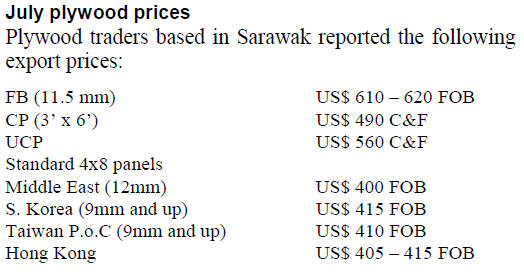
5. INDONESIA
Regulations said to be a drag on export
potential
Zanny Zapata Chandra, Secretary of the Indonesian
Furniture and Handicraft Association (HIMKI) DPD Bali,
has raised concerns over the decline in exports of
handicrafts and furniture from Balinese manufacturers.
Chandra said data from the Central Bureau of Statistics
show that exports of processed wood products in June
2017 declined over 25% compared to June 2016.
It appears that there has been a steady decline in exports
this year and that several factors are responsible, most
notably the problem of securing verified legal raw
materials and secondly the high cost of SVLK certification
especially for SMEs.
Chandra is leading a campaign by the HIMKI to seek
revision of the regulations as pertaining to SME SVLK
certification and in making it easier for companies to
secure raw materials.
Direct exports of merbau from West Papua to China
Millers in West Papua Province have made the first direct
shipment of merbau to Shanghai through Makassar Port
also known as the Port of Soekarno-Hatta.
Data from Indonesia shows this port has highest passenger
traffic among Indonesian ports and the largest cargo traffic
in Suluwesi. The Indonesian government ranked this port
as a primary port along with the Tanjung Priok in Jakarta,
Tanjung Perak in Surabaya and Belawn in Medan.
The first shipment of merbau was made by CV Sorong
Timber Irian and the Governor, Dominggus Mandacan
was at the port to see the departure of this first shipment
when he commented that direct shipping routes to China
have the potential to impact the economy of the provinces.
Domestic home building plan on track
For 2017 the Indonesian government has targeted the
building of 700,000 houses for low-income families and
300,000 houses for higher income earners. This plan is
part of the ‘one million houses programme’ launched by
Indonesian President.
Information from the Ministry of Public Works and
Housing shows that by the first half of this year almost
500,000 homes had been built, some 50% of the target.
More than half of these houses were built utlising central
government's funds.
The performance of the programme this year is better than
last year and this is attributed to the simplified process to
establish residential property projects for low-income
families. For example it has been made easier to obtain a
building permit and the building worthiness certificate.
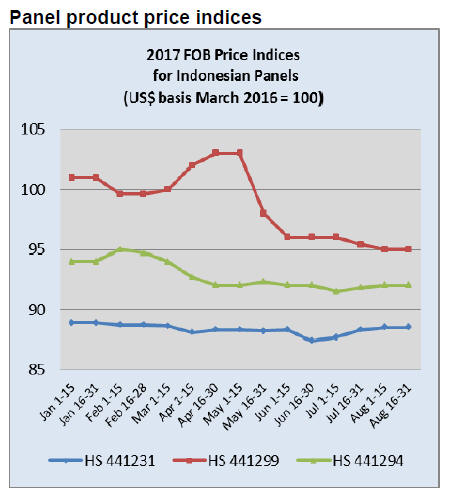
6. MYANMAR
MTE assesses its harvesting and transport
capacity
The Minister of Resources and Environmental
Conservation, Win Ohn, has informed the staff of the
Forestry Department and the Myanma Timber Enterprise
(MTE) that, to ensure transparency, third party civil
society organisations, national government institutions and
parliamentarians must be allowed to monitor the process
of hiring logging/harvesting service providers.
This was in response to concerns raised over recent move
by MTE to hire service providers due to the limited
capacity of MTE. After the heated debate on the issue of
contracting the private sector the MTE assessed and
detailed its own capacity in various areas as follows:
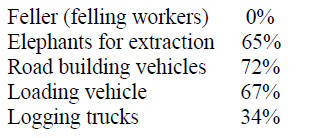
The plan is that the shortfall will be made up
through
contracts with the private sector.
The MTE is a state-owned enterprise responsible for the
harvesting of logs in Myanmar. Under the 1992 Forestry
Law, teak or any other hardwoods extracted by the MTE
are deemed legal.
Domestic payments to be made in Kyat says Central
Bank – an issue for MTE tender sales
It has become common practice in Myanmar to use
currencies other than the Kyat for local purchases. This
has led to a depreciation of the kyat and exchange rate
volatility.
In moves to reduce volatility and support the domestic
currency the Vice Governor of the Central Bank of
Myanmar (CBM), U Bo Bo Nge, has said action will be
taken against those who do not follow the recent
regulation requiring domestic payments to be made in
local currency.
The CBM has instructed that foreign exchange offices be
permitted to exchange Thai baht for Kyats. The Baht has
been the most common foreign currency used for domestic
payments.
Analysts have pointed out that MTE tenders are in US
dollars which runs counter to the new requirements and
that this issue needs to be resolved. MTE is regarded as an
important state-owned organisation and has been earning
hard currency for the country for around five decades.
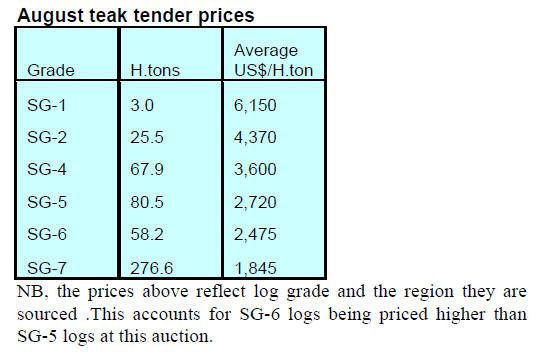
7. INDIA
Wood panel and veneer indices tip higher
India’s official wholesale price index for all commodities
(Base: 2011-12=100) for July 2017 released by the Office
of the Economic Adviser to the government (OEA) rose
by 1.1% to 113.9 from 112.7 in June.
The annual rate of inflation, based on monthly WPI, stood
at 1.88% (provisional) for July 2017 compared to 0.90%
for the previous month. Inflation for this financial year so
far was 0.62% compared to a rate of 3.81% in the
corresponding period last year.
The index for wood products and plywood rose by 0.9
percent to 131.7 (provisional) from 130.5 for the previous
month due to higher price of veneer sheets and
particleboard. However, the price index for sawnwood
declined.
The press release can be found at:
http://eaindustry.nic.in/cmonthly.pdf
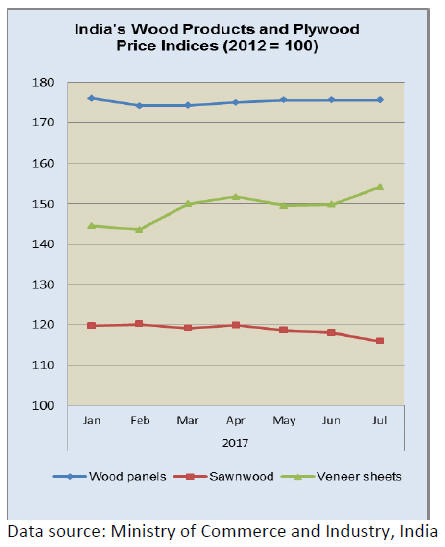
Plan to become more self-sufficient in timber
The Indian Prime Minister is pursuing an expansion of
domestic industrial wood production with the aim of
raising the income of farmers and of making the country
less dependent on wood imports. To achieve this he plans
to coordinate the efforts of all State Forest Departments
and private sector organisations.
The plan calls for the cultivation of industrial wood lots
and plantations along farm boundaries as well as within
the farm.
In addition to expanded farm forests the Prime Minister
wants to see large scale plantations on rural nonagricultural
land for example alongside roads, along
railway lines and along canal banks.
The main purpose of this plan is to allow India to be more
self-sufficient in wood products which will ease the import
burden which today runs into billions of dollars. It is
estimated that approximately 5 million hectares of lands is
available for this project.
Along with encouraging planting, the government will
remove current regulations that restrict
felling, transport and sale of trees grown on private land.
This issue was discussed with representatives of states in a
national consultation held last month. Though some States
expressed reservations, citing limits on available land,
most agreed to address changes to regulations and come
up with plans to encourage planting.
Plantation teak log prices C&F Indian ports
Demand for imported logs remains steady and importers
are benefitiing from the strong Rupee.
Pressure for a revision of Goods and Services Tax (GST)
on wood and wood products continues. At the September
meeting of the GST Council in Hyderabad, this is on the
agenda and the timber industry is hopeful of a successful
conclusion of this issue.
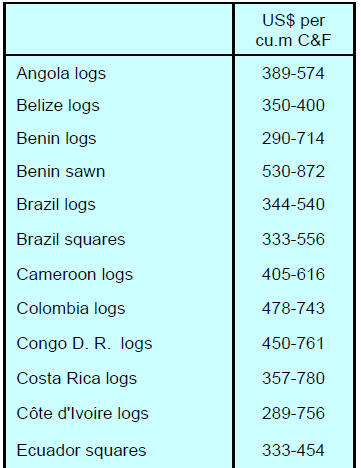
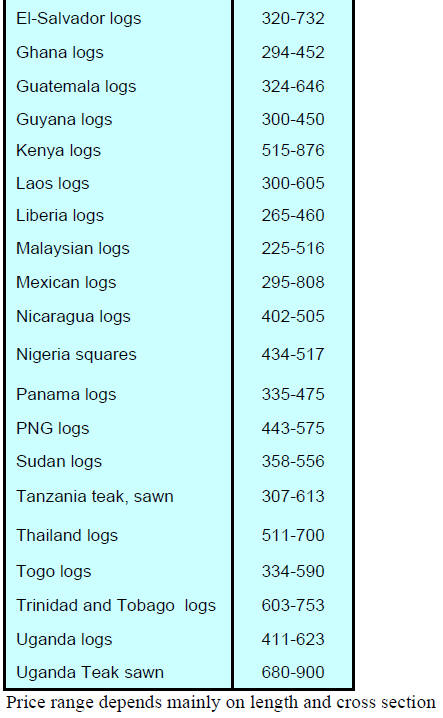
Locally sawn hardwood prices
Exmill prices for hardwoods are unchanged but are subject
to an 18% GST.
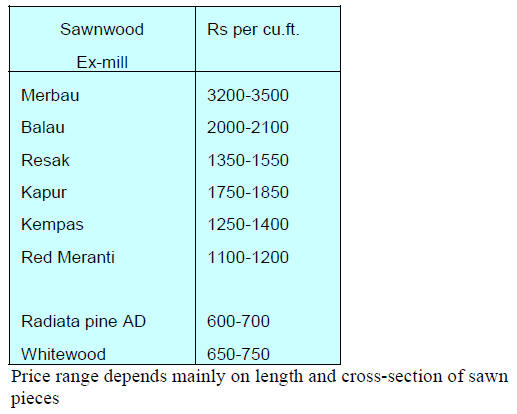
Myanmar teak prices
There was no change in the prices during the past
fortnight. The availability of sawn timber is satisfactory
but domestic sales have been affected by the high prices
and high GST.
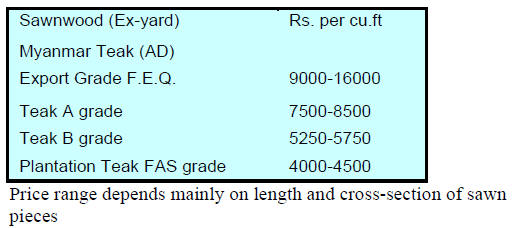
Prices for imported sawnwood
Prices for imported sawnwood (KD 12%) remain
unchanged.
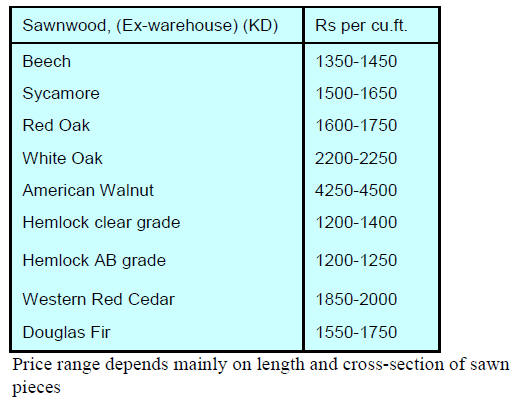
Plywood prices
As the outcome of negotiations on the GST rates for
panels isun known prices remained unchanged.
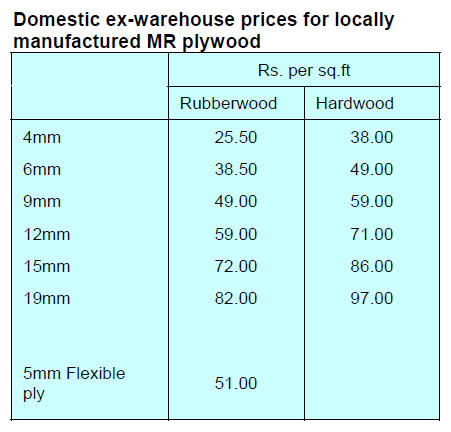
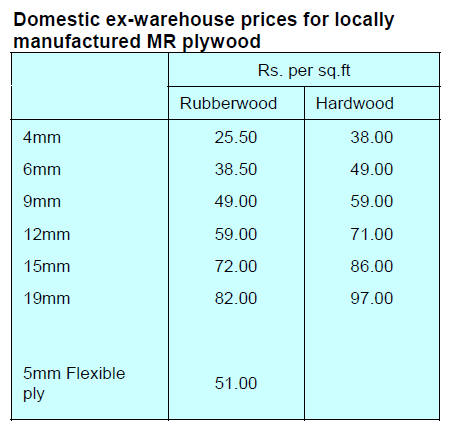
October in Mumbai
MUMBAIWOOD 2017 will be held 12-14 Oct 2017 in
Mumbai. This show will provide visitors with an
opportunity to meet new and existing manufacturers. This
show will bring together over 250 exhibitors, around
10,000 trade visitors and influential decision makers
within the woodworking and furniture manufacturing
industry from across India.
8. BRAZIL
Domestic furniture sales – a hint of
recovery
In June 2017, national furniture retail businesses achieved
a 1.2% increase in sales compared to May. This marked
three consecutive months of growth. However, the
furniture retail sales index for the first six months of 2017
declined slightly compared to the same period in 2016.
Timber inspection at fixed checkpoint harming the
forest sector
Beginning July the Mato Grosso State Agriculture and
Livestock Defense Institute (INDEA) launched its Timber
Identification Office in the Cuiabá Industrial District.
Following this move it became compulsory for trucks
transporting timber to go to this office where the timber
will be inspected and certified. This service is charged at
R$ 9.57 per cubic metre.
In an evaluation conducted after 30 days from the launch
of the new regulation requiring inspection at a central
location in the capital of Mato Grosso State, the Center for
Timber Producers and Exporters of Mato Grosso State
(CIPEM) reported several problems.
CIPEM has stated that the new system does not deliver
any benefits to entrepreneurs, the forest sector or the
environment. The evaluation by CIPEM found that trucks
had to queue for up to three hours to be inspected.
In order to avoid disruption to businesses CIPEM is
in
favor of the previous roadside check points whereby if the
transport documentation is in order trucks can proceed
quickly and only trucks with a problem would be directed
for further inspection.
The CIPEM survey found that the majority of cases
involving irregularities were with timber trucks from other
states and not from Mato Grosso. CIPEM also points out
that trucks with illegal timber no longer face the risk of
being detained as they can avoid the central inspection
point.
Export round-up
In July 2017, the total Brazilian exports of wood-based
products (except pulp and paper) increased 15.7% in value
compared to July 2016, from US$201.1 million to
US$232.8 million.
Pine sawnwood export values increased almost 40%
between July 2016 (US$ 27.8 million) and July 2017 (US$
38.8 million). In terms of volume, exports increased 27%
over the same period from 147,000 cu.m to 187,200 cu.m.
Tropical sawnwood exports in July increased 0.3% in
volume, from 32,400 cu.m in July 2016 to 32,500 cu.m in
July 2017 but the value of exports declined 2.0% from
US$14.8 million to US$14.5 million.
The year on year value of pine plywood exports increased
almost 45% in July, from US$33.9 million to US$49.0
million at the same time the volume of exports increased
from 130,300 cu.m to 172,700 cu.m.
Tropical plywood export volumes increased 10% and the
value of these exports in July 2017 rose 8% from 12,700
cu.m (US$5.0 million) in July 2016 to 14,000 cu.m
(US$5.4 million).
The good news continued with a rise in the value of
wooden furniture exports. July 2017 exports were worth
US$40.9 million compared to the US$35.9 million in July
2016.
IBAMA looking for increased budget for forest
surveillance operations
In June, a delegation from the Brazilian government met
with counterparts in Norway to discuss and review trade
agreements.
At the meeting the Norwegian government announced that
it planned to reduce the resources being made available to
the Amazon Fund because deforestation in Brazil rose
again. Analysts point out that a drop in funds for the
Amazon Fund puts at risk surveillance operations by the
Fund.
For in the past three years the Brazilian government has
utilised Norwegian resources for agencies such as the
Brazilian Institute of Environment and Renewable
Resources (IBAMA) and the National Public Security
Force.
A recent study on the use of resources from international
donations for the purpose of protecting the forests in
Brazil reported that more than US$2.2 billion was received
of which US$1 billion was donated by the Norwegian
government between 2009 and 2016.
According to the report in 2016 46% of the funds
contributed by Norway was earmarked for federal
agencies followed by State entities and NGOs.
In December 2016 the Ministry of the Environment
authorised the transferred R$56 million from the Amazon
Fund to IBAMA for operations to combat deforestation
during 2017. This amount is almost half of what the
Amazon Fund disbursed in 2016.
In March this year, the Brazilian government announced
the cutting of federal spending by R$42 billion in the
public budget. In response to this the Minister of the
Environment sent a letter to the Ministry of Planning
saying that the lack of money for forest inspection
operations has aggravated the deforestation in the Amazon
and asked that IBAMA's budget be increased in 2018.
Technical Trade Barriers committee discusses
regulatory issues
The Brazilian Association of Mechanically-Processed
Timber Industry (ABIMCI) has been invited to join, as an
advisory member, the Brazilian Committee on Technical
Barriers to Trade (Comitê de Brasileiro de Barreiras
Técnicas ao Comércio - CBTC) in the National Institute of
Metrology, Standardisation and Industrial Quality
(INMETRO).
This Committee discusses regulatory issues that impact
international trade to address potential problems to
expanded trade. In addition, the impactof technical barriers
to increasing exports are evaluated.
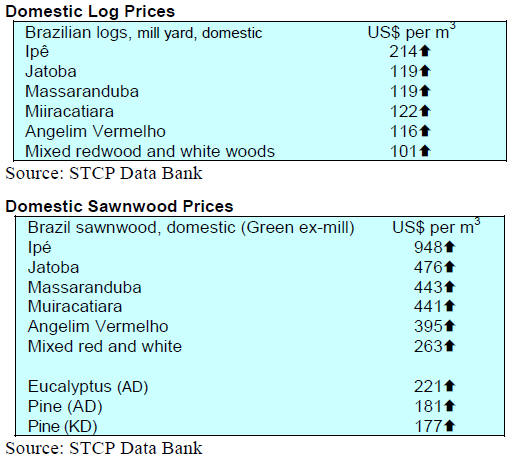
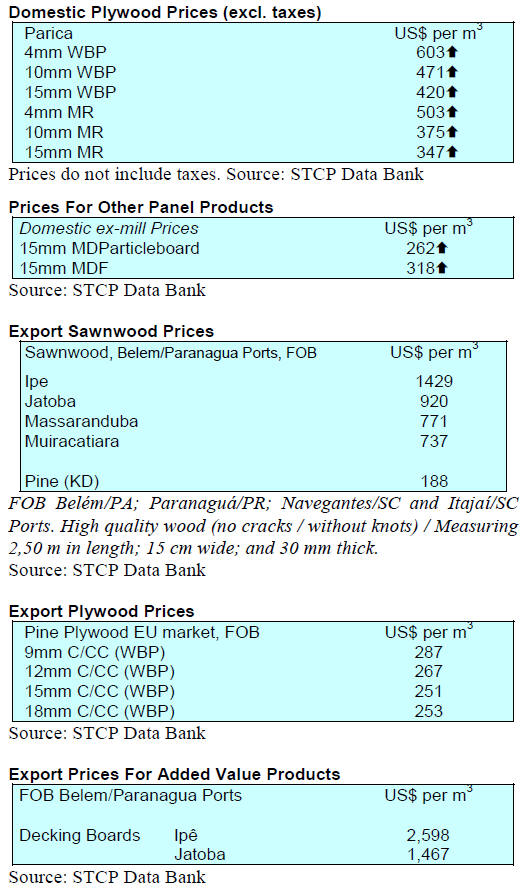
9.
PERU
Forestry experts share experiences with
Peru’s forest
officers
In an effort to boost management capacity the National
Forestry and Wildlife Service (Serfor) arranged a
workshop for local forest officers who had the opportunity
to interact with international experts from Chile and the
United States who shared their experiences in the
development of forest management systems.
At the four day event forest managers participated in
conferences, panels, conversations and workshops that
allowed them to share information on the application of
forestry and wildlife regulations.
Poor interpretation of regulations by officials
undermines image of the forest sector
Misinterpretation of the current regulations by the
authorities is an obstacle to the expansion of wood product
exports said Erik Fischer, the Chairman of the Committee
of Wood and Wood Industries of the Association of
Exporters (ADEX).
He said "This situation seriously damages the image
of the
sector, which ended 2016 with a exports dropping 15%”,
He cited a recent case where the Technical Forest and
Wildlife Management Lima Office (ATFFS Lima)
unnecessarily held up several shipments that had all the
required documents confirming legality.
Fischer said "It (the delay) was a purely administrative
issue, a misinterpretation of the norm and not for suspicion
of legality or for mismanagement of its traceability”.
Indigenous communities meet on forest management
The Forest and Wildlife Resources Oversight Agency
(Osinfor) and with support from the United States Agency
for International Development (USAID) and the US Forest
Service (USFS) conducted training for community forest
management in the native community Santa Mercedes del
Putumayo on the border area with Colombia.
Participants shared experiences related to community
forestry management in the native community Santa
Mercedes.
